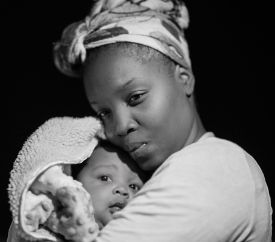Deniz Gursul, working in the Paediatric Neuroimaging Group, recently published her research in Current Biology. Her work demonstrates that gentle stroking modulates noxious-evoked brain activity in human infants.
Parents intuitively stroke their babies at this optimal velocity. If we can better understand the neurobiological underpinnings of techniques like infant massage, we can improve the advice we give to parents on how to comfort their babies - Professor Rebeccah Slater, head of Paediatric Neuroimaging
Deniz Gursul measured newborn infants' responses to medically necessary blood tests by detecting changes in their brain activity and observing their behaviour. Half the infants were gently stroked prior to the blood tests and the other half were not.
We hypothesised that gentle stroking would reduce pain-related brain activity, so we were pleased to see it. But we didn't see a reduction in how they reflex their limbs away from the heel lance. That could mean our intervention is perhaps causing a dissociation between limb movement and brain activity.
- Professor Rebeccah Slater
The stroking speed of approximately 3 centimeters per second is the same frequency that optimally activates a class of sensory neurons in the skin called C-tactile afferents. Sroking an adult at this speed has previously been shown to reduce pain in adults. This observation could explain anecdotal evidence of the soothing power of touch-based interventions such as infant massage and kangaroo care -- the practice of holding premature babies against the skin to encourage parent-infant bonding and possibly reduce pain.
Previous work has shown that touch may increase parental bonding, decrease stress for both the parents and the baby, and reduce the length of hospital stay. Touch seems to have potential analgesic benefits without the risk of side effect. - Professor Rebeccah Slater
The work was reported by the BBC, and Rebeccah Slater discussed this work on BBC World GMT (18th December 2018, 12:45pm).



